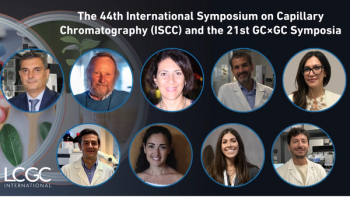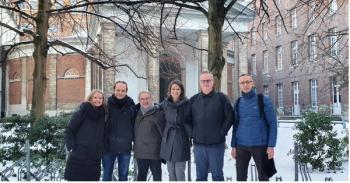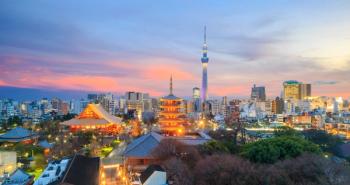
- January 2024
- Volume 20
- Issue 1
- Pages: 2–4
ISC 2024 Live In Liverpool
The Column interviewed Tony Edge, President of ChromSoc and Chair of the ISC Permanent Scientific Committee, to find out what participants can expect from the world’s oldest dedicated chromatography conference, being held this year in Liverpool, UK.
The International Symposium on Chromatography (ISC) 2024, which will take place from 6–10 October 2024 in Liverpool, UK, is a vital event in this year’s chromatography calendar. The Column spoke to Tony Edge, President of ChromSoc and Chair of the ISC Permanent Scientific Committee, to find out what participants can expect from the world’s first dedicated chromatography conference in this world-class city.
Q: ISC 2024 will be held in Liverpool, UK, from 06–10 October 2024. This seems a long time away, but I am sure you know as organizers that the opening ceremony will be happening before we know it! Are there any deadlines on the horizon that delegates, speakers, sponsors, and exhibitors should be aware of?
A: There is so much that has already happened and will be happening over the next couple of months. We have already contacted a multitude of sponsors and exhibitors, running through what the conference will offer the community, the web site has been launched (
Q: Does ISC have a value that is distinct from that of other conferences?
A: The ISC conference is the oldest dedicated chromatography conference, originally being established in 1956 by the German, French, and UK chromatography communities. From the beginnings it was a conference that was not focused on just one area of chromatography, and has attracted global attendance, despite being very much a European-based event. The broad spectrum of topics covered as well as the very international nature of the event mean that it is a unique opportunity to meet and hear from the great chromatographers of the day. There is also the opportunity to develop skills through the short courses and tutorials that are run throughout the event. Finally there are the social activities in a city that recently hosted Eurovision. It will be an incredible event for chromatographers to attend.
Q: What are you most excited about for the ISC 2024 conference? What do you want to achieve?
A: I am most excited by the fact that the conference is coming back to the UK. It has been two decades since the UK last hosted a large chromatography meeting, and it will be a real opportunity for the UK to show the rest of the world what we can do. In addition to that, we have an incredibly strong conference lineup, with chromatographers and chromatography users being well represented throughout the meeting. And then there is the social programme, and what better place for a night’s entertainment than Liverpool? The conference dinner will be held in the Anglican cathedral, a massive Gothic building which is an awesome setting, and then there is the night out for delegates at the Cavern Club, the iconic night entertainment venue which is often associated with introducing The Beatles to the world.
Q: Is there anything else new or different in the programme of ISC 2024?
A: ISC 2024 will contain all of the elements that we have come to love about the ISC conference series, including the awards, lively social programme, incredible speakers, Slam and Tube events, poster sessions along with flash posters, and along with these favourites we are also having a series of roundtable discussions on very topical issues and how chromatography can impact these. There will also be the inaugural Rising Stars of Separation Science Awards, organised by LCGC International in collaboration with the ISC organising committee.
Q: Can you tell us more about the plenary speakers?
A: We have eight plenary slots, and seven speakers have already confirmed their attendance. Each of the plenary speakers was chosen because of the impact that chromatography has on their own individual field, or because of the impact that the field is predicted to have on the world of chromatography. Topics and speakers include art restoration (Maarten van Bommel, University of Amsterdam, The Netherlands), use of AI (Anneli Kruve, Stockholm University, Sweden), environmental analysis (Alistair Lewis, University of York, UK), industry future perspectives (Kelly Zhang, Genentech, USA), sustainability (John Warner, Warner Babcock Institute of Green Chemistry, USA), food analysis (Ana M. García-Campaña, University of Granada, Spain), and chemometrics (Michal Holčapek, University of Pardubice, Czech Republic). The list of speakers, collectively, is internationally renowned in their own fields, and their impact on science has been phenomenal. It is with great pride that we are able to gather these scientists under the chromatography umbrella at Liverpool.
Q: What aspects of the conference will be of value to young scientists?
A: The training courses will cover a range of aspects of chromatography, from the introductory courses held on Saturday through the short courses to be held on Sunday and finally the tutorials held throughout the week. Obviously a strong academic programme will ensure that the learning journey continues throughout the week, and the poster sessions offer an opportunity for students to discuss their work with their peers from across the world. Finally, it is not all about work, and we are hopeful that the entertainment laid on will provide an environment where students can relax and see another side of chromatographers. As I mentioned previously, the Slam, Tube, and Rising Stars Of Separation Science events will showcase the work of young scientists. I am also really delighted that Shimadzu, a Platinum sponsor, has graciously offered to provide 10 young scientists the opportunity to attend, with more details on the website.
Q: Bob Pirok and Peter Schoenmakers are organising a special event on the Saturday before the event. Can you tell us more about this?
A: We had received feedback from students and individuals starting their career journey in chromatography that they struggled with some of the language and terminology that was used. They were keen to engage with other delegates but felt that a lack of understanding of some of the basics meant that they did not feel empowered to do so. We thought that we should look to address this, and we are very fortunate that Peter and Bob had already suggested running a training event. Thus, for delegates who are attending and want a “back to basics” training session, there will be a full-day training event held at the University on Saturday. The Saturday course will be free to attendees, so it is a definite must for individuals at the start of their careers.
Q: How important are poster presentations at ISC 2024? Are you doing anything new to increase visibility of posters?
A: Posters are incredibly important. We are very aware that for chromatographers starting their journey in chromatography, it can be very daunting delivering an oral presentation, and a poster presentation is a softer introduction allowing delegates to meet like-minded individuals but without the harsh glare of a conference auditorium. It also enables delegates to interact on a one-to-one basis with leading chromatographers, with the possibility of winning a prize, and we will be having more prizes than ever before in 2024.
Q: In today’s digital world—particularly given the many virtual events held since the start of the pandemic—do you think people need to be convinced of the value of attending an in-person scientific meeting?
A: I was concerned that vendors and delegates may look at a face-to-face meeting as not being a wise expenditure, however having attended several meetings recently, including the highly successful HPLC in Dusseldorf, it is evident that chromatographers thrive when they are together, which is slightly ironic. Online meetings do not allow for the socialisation that happens at conferences or the chance meetings. Conferences often initiate contact between individuals who would never connect online, and it also offers an opportunity to go through potential collaborations that are at best tricky to do online. Discussing new technology over a social drink and with pen and paper in hand is something that is not easily replicated, and certainly for the vendors having face-to-face meetings with hundreds of customers is incredibly valuable.
Q: Putting together a large conference is a lot of work. How will you judge if it was a success?
A: The success of the event will really only be demonstrated in the next ISC to be held in Prague, in the Czech Republic. We are hoping that we will create a real positive buzz about the conference, which understandably faded during the COVID years, so that Prague will be an even bigger success. If I was to look at a more immediate measure of success, it will be the amount of smiles and amount of participation that delegates have both in the academic and social programmes.
Q: Anything else participants should be aware of?
A: As well as those great academic and social programmes, Liverpool and the surrounding area have so much to offer in terms of cultural activities, not to mention the fantastic scenery offered by the Lake District and the Eryri National Park of North Wales. Liverpool truly is a world-class destination.
E-mail:
Website:
Articles in this issue
about 2 years ago
Rising Stars of Separation Science: Shijia Tangabout 2 years ago
Rolduc 2024about 2 years ago
Cell Membrane Chromatography with HALO-tag Technologyabout 2 years ago
LCGC International 2024 New Product Review Call For Submissionsabout 2 years ago
New Strategies for Oligonucleotide Aggregate Analysisabout 2 years ago
ChromSoc Announces 2024 Medal Winnersabout 2 years ago
Vol 20 No 1 The Column January 2024 North America PDFNewsletter
Join the global community of analytical scientists who trust LCGC for insights on the latest techniques, trends, and expert solutions in chromatography.




